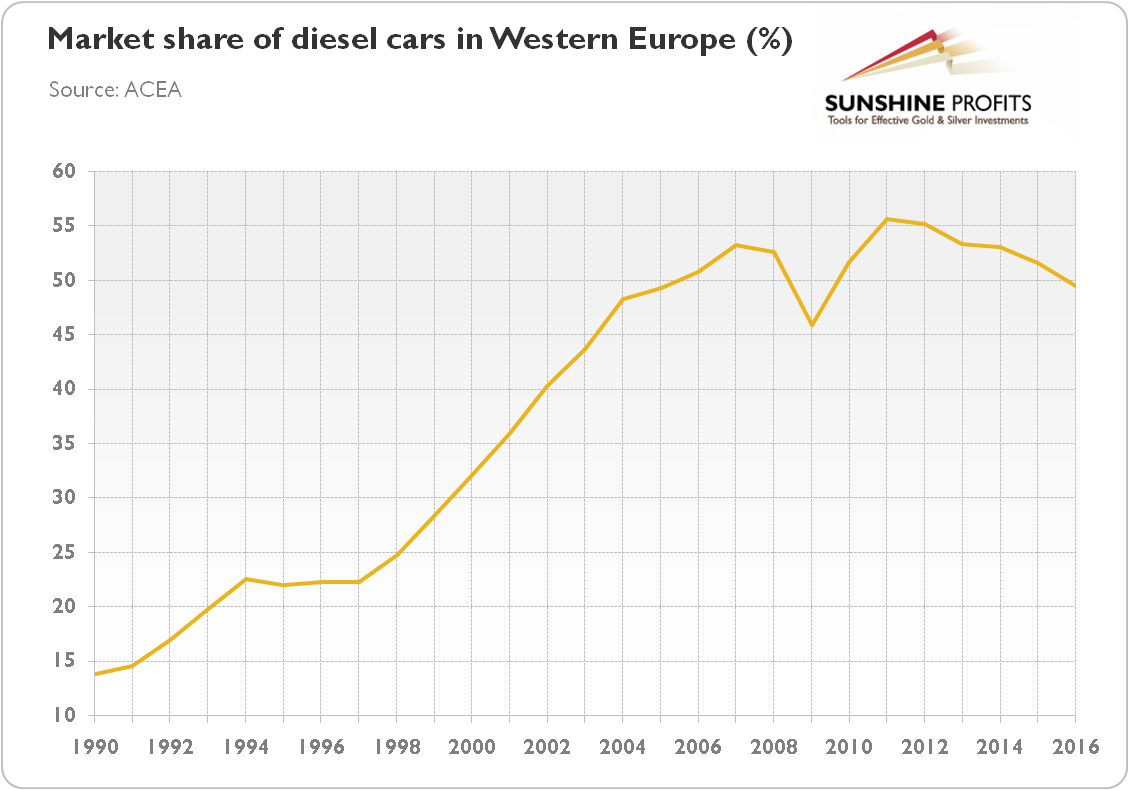The gloomy future of the diesel vehicles is commonly known. precious metals market. However, what does it really mean? And how could the demise of diesel technology impact the precious metal?
The 1970s oil crisis and accelerating inflation made diesel-powered cars popular, especially in Europe where gasoline prices were always higher than in the U.S. The new technology was considered as more efficient and less polluting, as diesel cars produce less carbon dioxide than gasoline cars (thanks to better mileage). Hence, policy makers started to support diesel and the market share of diesel cars went from 14 percent in 1990 to 50 percent in 2016, as the chart below shows.
Chart 1: Market share of diesel in new passenger cars in Western Europe from 1990 to 2016 (as %).

However, there was a catch. Diesel cars produce more nitrogen oxides, the main cause of smog. Although it was not a secret, it has recently turned out that diesel engines pollute much more than anyone thought. The new study published by Nature, which followed the Volkswagen (DE:VOWG_p) scandal, showed that diesel vehicles produce 50 percent more nitrogen oxide emissions than during laboratory certification testing. These excess emissions are associated with about 38,000 premature deaths globally associated with heart attacks, lung cancer, and strokes, among other things. However, the overall number of people who died prematurely due to Europe’s high share of diesel is in the hundreds of thousands.
Hence, given the rising ecological and health awareness, accompanied by the more stringent regulatory stance, diesel cars are likely to fall into oblivion. Indeed, as one can see in the chart above, the market share of these vehicles in Western Europe declined from 55.7 percent in 2011 to 49.5 percent in 2016. We expect further decreases in the years ahead, as more and more producers and authorities forsake this technology. For example, Volvo, AB ser. B (ST:VOLVb) declared in May that it would not develop any more new-generation diesel engines due to rising compliance costs, while the current generation would be produced until about 2023. Meanwhile, the mayors of Paris, Madrid, Athens and Mexico City have recently announced plans to take diesel vehicles off their roads by 2025. Actually, France went even further, as Macron’s government revealed its will to end sales of gasoline and diesel vehicles by 2040. And the Indian government also announced that every car in the country will be electric by 2030.
Actually, the demise of diesel vehicles may approach much earlier. According to a study by AlixPartners, diesels will have just 9 percent of the European market by 2030 due to a shift into electric cars. Last year, 14.6 million passenger cars were registered in Europe, half of that were diesel cars. In 2017, the Europe’s auto market is expected to start to flatten – the growth is projected at about 3 percent, much slower than in recent years. Fixing that growth rate, the European sales would decline to just about 2 million passenger cars, or by about 70 percent, by 2030.
The implications for the precious metals are very serious. First, platinum, which is mainly used as diesel exhaust emissions control catalyst, is likely to continue its underperformance relative to other precious metals. Given that the automotive sector accounts for about 40 percent of the overall demand for platinum, the need for the metal will decline by about 20 percent until then (we assumed that the absolute car sales would grow 33 percent and we did not include the truck segment, which accounts for about 40 percent of automotive demand, as diesel should maintain its position in that segment for much longer).
Hence, investors should not count on platinum prices rebounding and jumping above the price of gold again. Actually, the price of platinum may reach parity with palladium soon, which is mainly used in gasoline vehicles, or even decline below the price of its cousin.
Some analysts argue that with these prices close and with platinum being the more effective catalyst we might see a return of demand for platinum from the automotive industry. It’s possible, but not very likely – there may be a halt to any research to replace platinum with palladium as the predominant diesel exhaust emissions control catalyst at best. The truth is that automakers are frantically looking for non-precious platinum and palladium substitutes to cut costs.
So although it might be true that platinum is cheap, there are good fundamental reasons why it is cheap. There is structural change ongoing in the automotive sector, which is likely to cause diesel cars losing market share. It may be not evident at this stage, but investors are always forward-looking. Unless platinum-group metals find new applications, their long-term investment attractiveness will decline.
